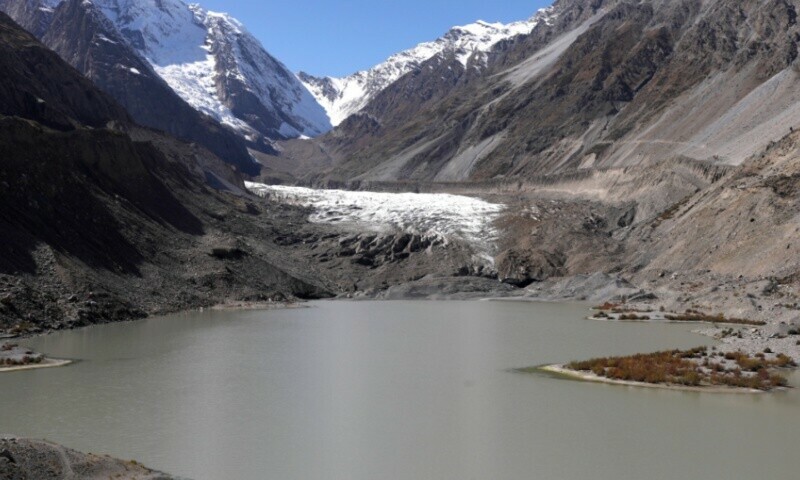A glacier burst in Gilgit-Baltistan’s Bagrot Valley caused the death of one person on Friday, while his father was injured, according to the regional government’s spokesperson.
A glacial burst, or glacial lake outburst flood (Glof), refers to an outburst of water from a glacial lake which could lead to severe flooding downstream. Pakistan is home to over 13,032 glaciers, the largest reservoir of glaciers outside of the polar regions. However, experts have warned that about 10,000 glaciers in Chitral and GB have been reported to be receding due to climate change–induced temperature rise.
GB’s government spokesperson, Faizullah Faraq, said that the father and son had fallen into a ravine and been buried under the debris of the Bagrot glacier as it burst, injuring both.
“Locals and Rescue 1122 saved the father while the son was killed,” he said.
Former member of the Bagrot Valley Assembly, Captain (retd) Muhammad Shafi, said that the father and son had been travelling on foot on the glacier in Barchi village when it collapsed.
“The father was rescued after several hours of efforts by the rescue team, but the son could not be rescued alive,” he said, adding that the father was transported to the hospital.
According to local journalist Imtiaz Gulab Bagoro, the father and son were from Balchi village. They were heading from Gargo village to Barchi village when the glacier collapsed.
He said that the father and son were rescued after 10 hours, while Gilgit Rescue 1122 reported that the rescue took eight hours.
The rescue team added that the son’s body had been moved to his native village of Balchi.
According to Faraq, new flash floods had “wreaked havoc in every direction” in the Khanbari area of Diamer district.
“Floods in Khanbari have destroyed people’s standing crops, lands and water channels,” he said, adding that floods were continuing across the province.
The Bagrot Valley has been a victim of climate change for the past several years, with many Glofs affecting the population.
According to non-governmental organisations (NGOs), several glacial lakes have formed in the valley.
To reduce the risks of these glacial lakes, NGOs have planted hundreds of trees in the Bagrot Valley and built protective walls with foreign aid. Early warning systems have been installed at several places in GB to inform the population about the flood situation due to climate change.
Safdar Ali, who is in charge of the information department of the Glof project, said that 200 early warning stations had been established in 16 valleys to protect the human population from flood waves due to climate change, of which 147 stations were active.
According to him, the early warning system had reported the danger in the Hassanabad nullah, but “since there was no major threat to the population, the practice of repeatedly sounding the siren did not continue”.
Ali said that the data of the early warning system was being transferred to the meteorological department, based on which weather alerts were being issued.
In June, the National Disaster Management Authority’s National Emergencies Operation Centre issued a Glof alert for northern areas, including GB, citing a dangerous combination of persistent high temperatures, intensified monsoon currents and a prevailing westerly wave.
The same month, three members of a family, including a man and his teenage son, were buried alive in a glacial slide while taking pictures at Sohni Waterfall near Naran.
Last year in August, a glacial lake outburst hit a village in Upper Chitral district, displacing 30 families.
